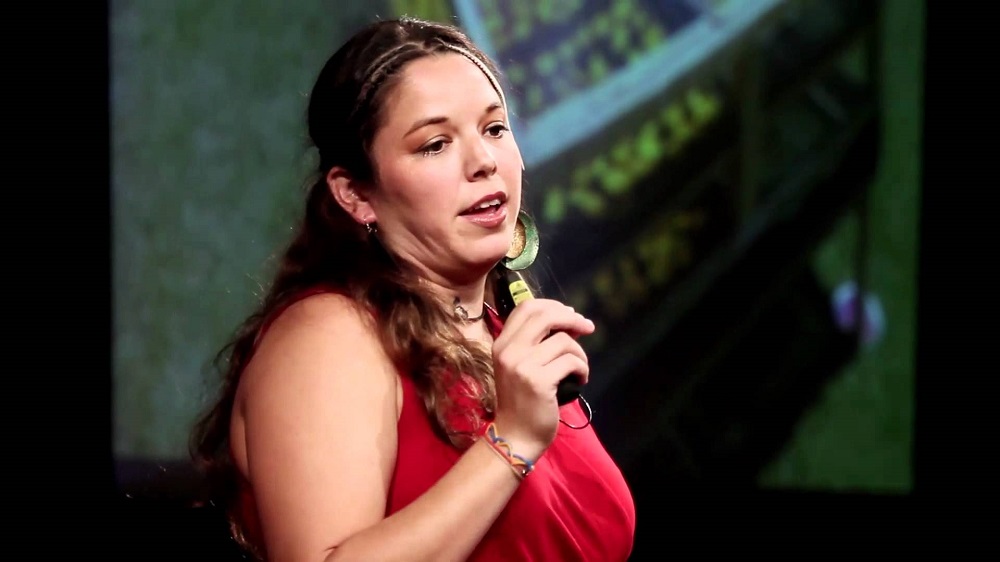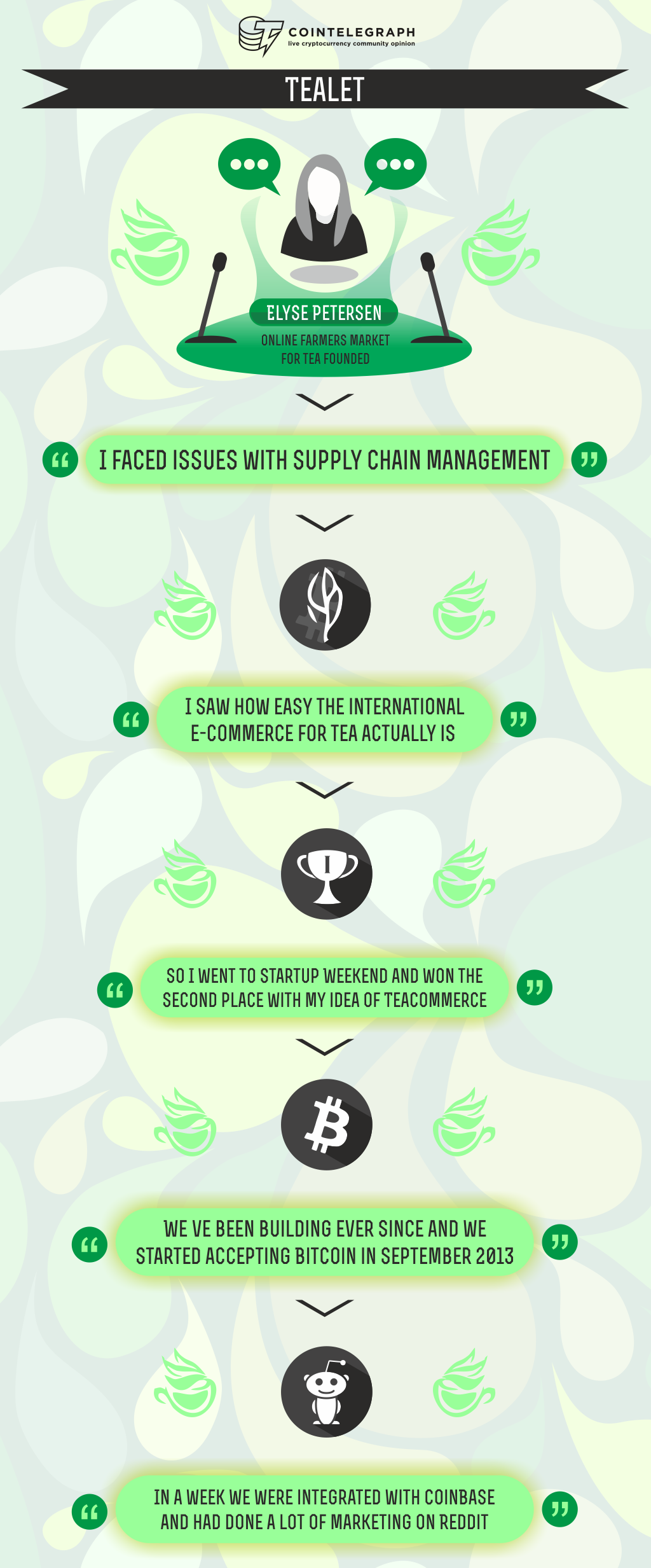Tealet is an online farmers market for tea founded by food scientist Elyse Petersen. With an extensive background in the tea industry and with a dream of solving tea the production and distribution problems Elyse explains why tea is a good place to start Bitcoin adoption and tells us how she sees BTC payments shaping the future of agriculture as a whole.

Cointelegraph: How and why did you start Tealet?
Elyse Petersen: I was doing quality assurance for a large tea manufacturer and I faced issues with supply chain management. I was trying to verify whether the tea was really organic, fairtrade, what were its origins and many other things, but I never got these questions answered. Eventually, I quit.
After that I did an MBA in Japan and a project with tea farmers in Hawaii in order to help them enter the high-end tea market. Then I worked in a tea farm in Japan and helped them with their e-commerce strategy. This is when I saw how easy the international e-commerce for tea actually is.
Tea is the only commodity in the world that does not have a customs tax in any country. So it is easy to get into the market of moving tea around - there are no legal barriers for that.
“Tea is the only commodity in the world that does not have a customs tax in any country.”
-Elyse Petersen
We created a non-profit ‘International Tea Farms Alliance,’ a network of tea farmers around the world. The key goal was to bridge the gap between the tea grower and tea lover - all the way from production to consumption. However, there was no funding to keep the project going after I left that internship. My boss advised that if I wanted to continue the mission, I should launch my own business.
So I went to Startup Weekend and won the second place with my idea of TeaCommerce. It was a dummy website with tea farmers from the US trying to sell tea to consumers in the US by telling the story of the farmer, kind of an Etsy-type marketplace for tea farmers.
One of the judges was a venture partner from 500 startups, a prominent VC and accelerator in Silicon Valley. He immediately saw the value in what we were doing - they really love to see teams like ours bring traditional, old-fashioned businesses online.

He said: ‘Start building something and start selling your products. If you can prove to us that people will buy your product, we will talk about investment.’ This was my start of the journey, in May 2012. We’ve been building ever since and we started accepting Bitcoin in September 2013.
CT: That sounds great. So, tell us what inspired you to integrate with Bitcoin?
EP: Actually, the integration with Bitcoin was a pet project of our developer, who is a big Bitcoin advocate. He finished our website; everything was working well and looked beautiful. That was when I finally bumped the Bitcoin feature to the top of his tasklist and said ‘Okay, go for it!’
In a week we were integrated with CoinBase and had done a lot of marketing on Reddit. That was at the time when the whole merchant phase was just starting and pretty much every article in Bitcoin stories was about new merchants accepting Bitcoin, so we rode that wave and it was great. Bitcoin subreddit was definitely the first place to go and we saw immediate success.

But there was also something special about our campaign that attracted people - in our business model then and ever since we are trying to cut out unnecessary middlemen, same like in Bitcoin. Currently if a farmer wants to sell his product he has to go through this auction system with all these brokers and essentially they are the last people in the chain where the price gets pushed down to.
“In our business model then and ever since we are trying to cut out unnecessary middlemen, same like in Bitcoin”
-Elyse Petersen
We have surveyed all our growers and found out that in the current system on average only 15% of the profit on tea actually gets back to the growers. 85% gets absorbed by all the middlemen. It is not surprising because during the first wave of globalization we actually needed that physical network of agents and brokers, all those men in suits that made deals at the tables. But now we have the internet and our needs have changed.
I think our campaign resonated with the Bitcoin community because it was ‘Don’t let tea farmers get abused, use our resource. Don’t let us get abused by financial system - use Bitcoin’ - it originally had a harsher verb in it and we had to take it down after one of our farmers saw it and was ashamed. However, I believe it resonated with the community and I think it worked to do what we wanted. Because using your Bitcoin to buy a gift card at ‘Target’ is not really what we want. It is not helping the Bitcoin ecosystem because the money is just getting turned back into fiat anyway.
We really advocate for conscious consumption and getting the money to the producer. We welcome people who ask questions about where their things come from; try to localize everything as much as possible. Grow local yourself. If you can’t, go to the farmer’s market. If you can’t, ask your grocery or your merchant ‘Where is this stuff coming from?’ Because the more you ask, the more pressure will the merchants feel.
CT: What impact did you notice after integrating with Bitcoin?
EP: Firstly, we faced increased demand and growing sales, which immediately allowed us to buy more products from the farmers and generated more business for them. This impact was the most important for us.
We also noticed and appreciated the efficiency of moving money with Bitcoin. Some of this benefit we share with our customers. For example, we give them a 3% discount for every Bitcoin purchase because we are saving it anyway, so we may as well pass it on.
“Bitcoin payments are a real way for tea farmers to save 10-12% of their income that is currently spent on money transfer fees.”
-Elyse Petersen
On the farmers’ side, we have actually only done one transaction in Bitcoin with a farmer; we are still getting things lined up for it. But this farmer is located in Nepal. Usually, when I send money to Nepal my bank charges me an 85 USD fee. And this is only the fee I have to pay on my side for sending the money there. In addition to that, the farmer also has to pay an about 4% fee in Nepal to convert the money back into his currency. Our average transaction is about 700 USD and these fees eat up already 10% of it.
Now we use CoinBase to send him that money now because he has an account in US and now the fees are reduced to zero. What we are most excited about is the perspective of developing a network of Bitcoin payments in India. A lot of our tea is being grown there. Currently we use PayPal and it is convenient for me because I do not have to pay any fee, but it is inconvenient for farmers because PayPal takes a fee of about 10-12% from them. Since they are already working with slim margins, it is hard to afford it.
If everything stays as it is, no young generations of farmers will stay at tea farms growing tea for the current slim margin - all the young people are getting educated and moving to the city. If nothing changes, in some years, no one will be there to make the tea we love, because no one wants to do it. They see that they cannot make a living out of growing tea.
“We are telling people that Bitcoin payments is their contribution to the tea they love.”
-Elyse Petersen
Fighting the middlemen who jeopardize fair margins for producers including Bitcoin payments to fight transfer fees can help. We are telling people that Bitcoin payments is their contribution to the tea they love. Since food is the most important of our necessities, it is a paradox that we treat the very people who produce it for us so badly and push them out of business. I believe we should be advocating them and striving to give them the best end of the margin.
We should in some sense even put them on pedestals and treat them like heroes because we would not be able to live without them. I have heard many stories in this context from developing countries where Bitcoin helps farmers move money and improve their lives. I also believe it will be great once this story fully develops and everyone will see that agriculture is a great application for Bitcoin and other cryptocurrencies.
CT: It is great to hear you see Bitcoin as a tool for improving the entire agriculture industry. Can you think of other use-cases where it could be particularly beneficial?
EP: The most obvious application for me is in international commodities. On a local scale, Bitcoin is currently the fastest and easiest way to operate local farmer markets or food delivery services, I can imagine a future when these family-businesses are run on technology. It would also save them money in transaction fees.
“I believe it will not be hard to convince merchants to adopt Bitcoin.”
-Elyse Petersen
Everyone is trying to get the consumers to adopt Bitcoin and it is hard because they look at the price and they say: ‘What am I going to use it for? I am just going to lose my money if I buy it.’ But trying to convince merchants and business people to adopt is not that hard. There are at least three good selling points that come into my mind straight away:
- You don’t have to pay the 3% credit card fee anymore
- You don’t have to pay 12% in international payment fees
- You make it a lot easier and faster
This is where I believe the focus of Bitcoin marketing should be right now. This is the movement we support and this is why we want to tell our story - to inspire more merchants to adopt Bitcoin.
CT: And last but not least - we know that you also pay your employees in Bitcoin. Could you tell us more about this?
EP: Yes, we do. We want to attract innovative team members, which is why we incentivize them by allowing them to take part of their paycheck in BTC. Our developer wants all of his paycheck in bitcoin, but everyone else is happy to take just 20% in BTC. To incentivize this we are matching up to 20% of bitcoin.
For example if the paycheck is US$1000, the employee is paid $800 in USD and $200 in bitcoin (at the current market price). Tealet will pay an additional $200 in bitcoin. We won't be doing this forever, but it is a cool way we believe our team members can embrace the Bitcoin culture and help our company become a leader in the Bitcoin merchant movement.
Did you enjoy this article? You may also be interested in reading these ones:
